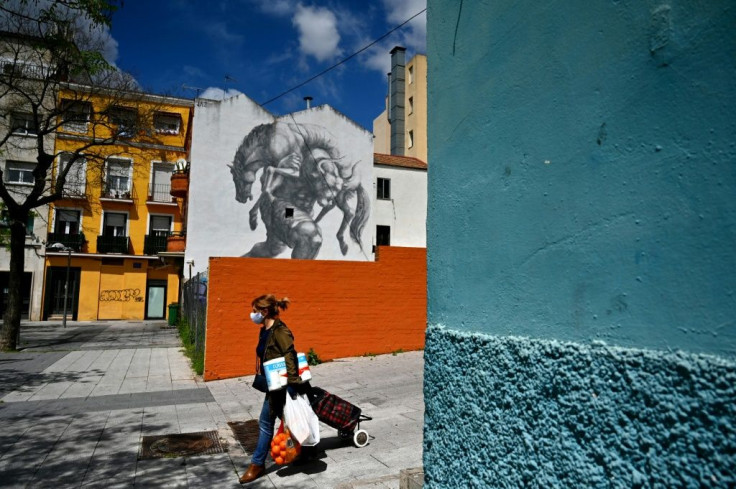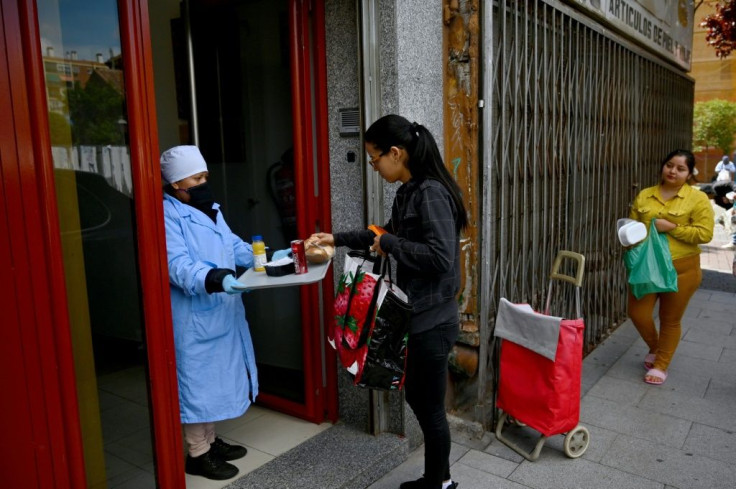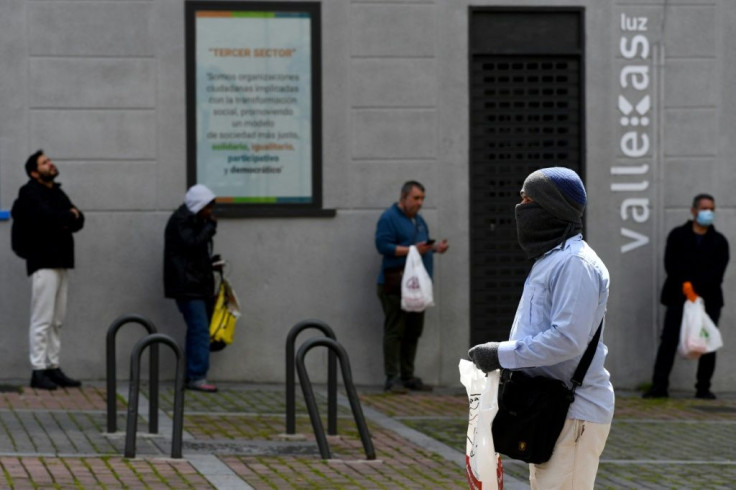Pandemic, Economic Crisis Hit Madrid's Working Poor

In the shadow of a Madrid church, a crowd of men and women stand in line to collect handouts of basic foods they can't afford.
Their working class district of Puente de Vallecas in Madrid is the hardest hit by the coronavirus outbreak that has seized the city.
It is also the most vulnerable to the economic crisis that has followed.
Gloria Corrales, a 50-year-old immigrant from Colombia, is one of the roughly 450 people who have started coming daily to the San Jose soup kitchen near the church.
She used to work for a family looking after a 92-year-old woman, but after the coronavirus hit, she lost her job almost immediately.
"I got sick with a common flu. They told me not to come back. They feared I would infect her," she says.
The church has seen several cases of people like Corrales who were let go "out of fear that they could be contagious", says Susana Hortigosa, in charge of media relations at the parish.
With more than 22,000 coronavirus deaths and some 213,000 infections, Spain is one of the worst-affected countries by the pandemic sweeping the globe.
It has hammered the nation's most vulnerable, especially those living in working-class neighbourhoods like Puente de Vallecas.
Home to around 230,000 people, the district in southeastern Madrid has long been a home to newcomers to the city, at first Spaniards from other parts of Spain and more recently immigrants from Latin America, Morocco and Eastern Europe.
It is one of Madrid's poorest neighbourhoods, with many people working construction jobs or in the hospitality sector, which offer low wages and little job security.

"We are already feeling major effects from the economic crisis which the health crisis has caused. People are suddenly becoming unemployed," says Hortigosa at her red-brick walled office at the church where her phone rang non-stop.
"A lot of people are asking for help," she adds.
Spain has still not fully recovered from the sharp economic downturn it suffered during the 2008 global financial crisis, and the Bank of Spain predicts the economic contraction due to the pandemic will be "unprecedented in recent history".
Pedro Oran, a 53-year-old Spaniard, says work has dried up because of the pandemic.

He says he normally earns 30 euros ($32.50) a day helping a plumber, allowing him to "get by" even though he had no job contract.
"But with the pandemic, nobody calls," Oran says, lining up to collect food for the first time.
Behind him stands a woman who used to clean holiday apartments.
"When tourism stopped, so did my job," she says.
Even a 30-year-old Venezuelan rider for a food delivery company stopped by at the food kitchen to fill plastic containers with food.
He gets paid a few euros for each delivery he makes and is struggling to pay 500 euros in monthly rent for the room he and his wife live in.
According to a district map published by the regional government of Madrid on April 8, Puente de Vallecas recorded the highest number of confirmed coronavirus cases in the preceding two weeks.
Among the victims of the pandemic is a man who taught ballroom dancing at a seniors' centre on the neighbourhood's tree-lined high street.
He and his wife, who also taught dance at the centre, were taken to hospital on March 7, the day all nursing homes in Madrid were closed.
"The husband died, he was 80 and had a splendid appearance," says Asela Baraja, 68-year-old volunteer at the centre.
From the first floor balcony of a modest building on the high street, Patricia Dominguez, a 55-year-old Colombian widow, says the virus made her "panic" so she was staying at home as much as possible.
She used to earn 700 euros a month as a cleaner but was fired, as was her roommate who made 600 euros a month looking after an elderly woman.
Despite getting two 30-euro supermarket vouchers from the Red Cross and help from a local charity, she says times are tough.
"We are eating little," Dominguez says.
"Living with a double fear, of the virus and the economic crisis".
© Copyright AFP 2024. All rights reserved.





















